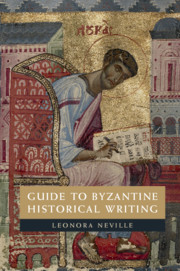Book contents
- Frontmatter
- Dedication
- Contents
- Acknowledgments
- Introduction
- Byzantine Historical Texts
- 1 Theophylakt Simokatta
- 2 Paschal Chronicle
- 3 George Synkellos
- 4 Chronicle of Theophanes
- 5 Patriarch Nikephoros
- 6 Scriptor Incertus de Leo V
- 7 Chronicle of 811
- 8 Megas Chronographos
- 9 George the Monk
- 10 Peter of Alexandria
- 11 Genesios
- 12 Theophanes Continuatus
- 13 Constantinian Excerpts
- 14 John Kaminiates
- 15 Symeon the Logothete
- 16 Leo the Deacon
- 17 Chronicle of Monemvasia
- 18 Chronicon Bruxellense
- 19 Psellos
- 20 John Xiphilinos
- 21 Michael Attaleiates
- 22 John Skylitzes and Scylitzes Continuatus
- 23 George Kedrenos
- 24 Nikephoros Bryennios
- 25 Anna Komnene
- 26 John Kinnamos
- 27 John Zonaras
- 28 Constantine Manasses
- 29 Michael Glykas
- 30 Eustathios of Thessaloniki
- 31 Joel
- 32 Niketas Choniates
- 33 George Akropolites
- 34 Theodore Skoutariotes
- 35 George Pachymeres
- 36 Nikephoros Gregoras
- 37 Ephraim
- 38 Constantine Akropolites the Grand Logothete
- 39 Chronicle of Morea
- 40 Nikephoros Kallistos Xanthopoulos
- 41 John VI Kantakouzenos
- 42 Michael Panaretos
- 43 Chronicle of Ioannina
- 44 Chronicle of Tocco
- 45 John Kananos
- 46 John Anagnostes
- 47 Leontios Machairas
- 48 Sylvester Syropoulos
- 49 Doukas
- 50 George Sphrantzes
- 51 Michael Kritovoulos
- 52 Laonikos Chalkokondyles
- Appendix A Time Periods Covered in the Histories
- Appendix B Timeline of Authors’ Lives
27 - John Zonaras
from Byzantine Historical Texts
Published online by Cambridge University Press: 14 June 2018
- Frontmatter
- Dedication
- Contents
- Acknowledgments
- Introduction
- Byzantine Historical Texts
- 1 Theophylakt Simokatta
- 2 Paschal Chronicle
- 3 George Synkellos
- 4 Chronicle of Theophanes
- 5 Patriarch Nikephoros
- 6 Scriptor Incertus de Leo V
- 7 Chronicle of 811
- 8 Megas Chronographos
- 9 George the Monk
- 10 Peter of Alexandria
- 11 Genesios
- 12 Theophanes Continuatus
- 13 Constantinian Excerpts
- 14 John Kaminiates
- 15 Symeon the Logothete
- 16 Leo the Deacon
- 17 Chronicle of Monemvasia
- 18 Chronicon Bruxellense
- 19 Psellos
- 20 John Xiphilinos
- 21 Michael Attaleiates
- 22 John Skylitzes and Scylitzes Continuatus
- 23 George Kedrenos
- 24 Nikephoros Bryennios
- 25 Anna Komnene
- 26 John Kinnamos
- 27 John Zonaras
- 28 Constantine Manasses
- 29 Michael Glykas
- 30 Eustathios of Thessaloniki
- 31 Joel
- 32 Niketas Choniates
- 33 George Akropolites
- 34 Theodore Skoutariotes
- 35 George Pachymeres
- 36 Nikephoros Gregoras
- 37 Ephraim
- 38 Constantine Akropolites the Grand Logothete
- 39 Chronicle of Morea
- 40 Nikephoros Kallistos Xanthopoulos
- 41 John VI Kantakouzenos
- 42 Michael Panaretos
- 43 Chronicle of Ioannina
- 44 Chronicle of Tocco
- 45 John Kananos
- 46 John Anagnostes
- 47 Leontios Machairas
- 48 Sylvester Syropoulos
- 49 Doukas
- 50 George Sphrantzes
- 51 Michael Kritovoulos
- 52 Laonikos Chalkokondyles
- Appendix A Time Periods Covered in the Histories
- Appendix B Timeline of Authors’ Lives
Summary
This is an extensive history from Creation to 1118. Although it starts with Creation, it does not have most of the features associated with the Byzantine chronicle tradition. It uses classical Greek and is relatively secular in outlook. It almost entirely consists of shortened summaries of classical histories. The text draws extensively on the texts of Josephus and Cassius Dio.
Zonaras's text begins with Creation and ends with the death of Alexios Komnenos in 1118. Aside from beginning with Creation, this secular and classicizing text does not conform to the tradition of chronicle writing. DuCange divided the Epitom ē Istori ō n into eighteen roughly equal books for his 1686 edition. In one of the manuscripts (Parisiensis Regius 1715) a marginal note at the beginning of Book 9 provides a title “The Historical Epitome selected and written by the monk John Zonaras. The earlier book had the Hebrew and Roman matters and the consuls. This book is the history of the emperors.”
Because of Zonaras's close use of classical texts, the study of his sources is well advanced. While Zonaras paraphrased his source texts more often than copying directly, he stayed close enough to the original that we can usually tell which classical text he was using. His history has been used to reconstruct lost books of Cassius Dio's history. Zonaras's discussion of Creation and biblical history mostly summarizes Josephus’ Jewish Antiquities and the Jewish War. He expands Josephus's treatment of Daniel to include material from the Book of Daniel and Theodoret's commentary on Daniel's prophesies. He inserts an epitome of Xenophon's Cyropaedia into his history of Cyrus in Book 3. He employs Plutarch's Life of Alexander in Book 4. Book 7, on early Roman history, uses Plutarch's lives of Romulus, Numa, Publicola, Camillus, and Cassius Dio. Books 8 and 9 are selected from Dio. Book 10, which begins the story of the emperors, uses Plutarch's Pompei, Caesar, Eusebius's Ecclesiastical History, and Dio. Books 11 and 12, covering history from Tiberius to Maximianus, use Eusebius, Dio, and Xiphilinos's epitome of Dio. For the fourth through eleventh centuries, Zonaras seems to draw on Malalas, Prokopios, Theophanes, George the Monk, Psellos, Attaleiates, Skylitzes, and Scylitzes Continuatus. His account of Alexios Komnenos appears to be based on original research or personal knowledge.
- Type
- Chapter
- Information
- Guide to Byzantine Historical Writing , pp. 191 - 199Publisher: Cambridge University PressPrint publication year: 2018



